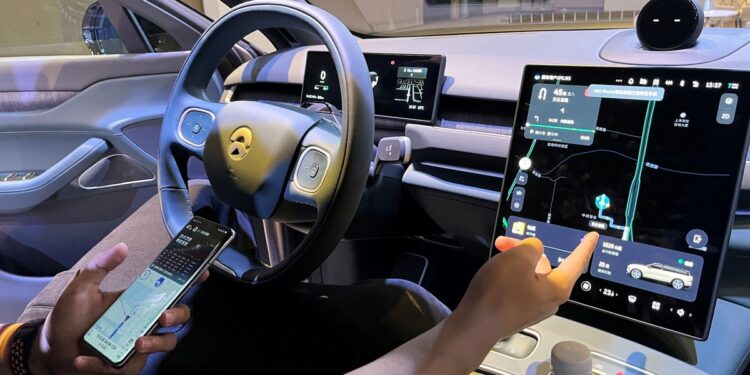More on:
China
European Union
United States
Technology and Innovation
China Strategy Initiative
The U.S. rule is not driven by alarmism or protectionism. It aims to create a firewall against a potential influx of mostly Chinese smart cars into the U.S. market that would pose significant cybersecurity and supply chain risks to critical infrastructure and sensitive data. The new rule comes not a moment too soon, given China’s impressive rise to become the world’s top automobile producer in 2023.
Asia Unbound
CFR fellows and other experts assess the latest issues emerging in Asia today. 1-3 times weekly.
The U.S. rule specifically targets two systems in modern and future cars: vehicle connectivity systems (VCS), which collect and transmit data wirelessly; and automated driving systems (ADS), core technologies that control the autonomous vehicles that will fill the roads of the future. Modern vehicles are becoming AI-enabled mobile data centers, packed with thousands of sensors – embedded in cameras, microphones, navigation systems and other technologies that connect cars to the internet. But these conveniences create new dangers: Beijing could remotely access vehicles to exfiltrate data, sabotage their operations, and even disrupt the critical infrastructure that cars connect to via 5G, WiFi, satellite, and Bluetooth.
These threats are not theoretical. In 2022, Russian soldiers stole John Deere tractors from a farm equipment dealership in Ukraine, but the company was able to disable them via remote access. China’s ability to wreak digital havoc, particularly in time of war, would make the incident look like a parlor trick. Multiple U.S. and allied government agencies have warned that Chinese state-sponsored hackers have infiltrated U.S. critical infrastructure and maintain persistent access to information technology, energy, water, wastewater, and transportation systems, ready to disrupt them in case of a conflict. Beijing-linked hackers have likewise compromised internet-connected devices in Europe and around the world.
Allowing millions of Chinese-designed and manufactured connected vehicles onto roads in the United States and Europe would be negligent on the part of policymakers.
In the United States, industry is quietly waking up to the challenge, but it needs a government nudge to act. As it consulted with car makers ahead of issuing the rule concerning the use of Chinese- and Russian-made components in connected vehicles, the Commerce Department discovered that many companies recognize the need for enhanced supply chain and cybersecurity measures and welcome the forthcoming measures. Although firms with business interests in China are unlikely to publicly voice support for the new U.S. policy, fearing retribution from Beijing, the rule is hardly escalatory. Foreign automakers in China are subject to onerous data localization and cybersecurity rules, arbitrary audits, and physical tampering of their business systems – all products of Beijing’s years-long quest to dominate global markets in advanced industries.
More on:
China
European Union
United States
Technology and Innovation
China Strategy Initiative
Chinese automakers, like their peers in other industrial sectors in China, have benefited from heavy state support and predatory economic practices, such as massive subsidies, local content requirements, forced tech transfers, and IP theft. In the past, policymakers in the west have been far too slow to respond. From steel and solar panels to shipbuilding and Internet of Things (IoT) devices, industry after industry has been overtaken by unfair Chinese competition. Policymakers failed to act decisively to prevent future harms, instead engaging in protracted negotiations that produced agreements that Beijing subsequently failed to uphold.
The United States is already looking beyond vehicles, eyeing similar regulations for a range of connected technologies, including drones, robotics, batteries, satellite ground stations, and cloud computing. These efforts should be vigorously pursued. Developing rules now prevents the “Huawei problem” that has plagued the west from playing out in the automobile sector. Banning the Chinese telecom giant’s gear from domestic networks after it was already in place resulted in costly programs to “rip and replace” it with trustworthy equipment. Announcing restrictions on China-origin connected vehicles now, before they have gained significant market share, ensures that the rule will be minimally disruptive to U.S. industry and consumers. Moreover, the Commerce Department has included generous phase-in periods. As currently written, the rules will enter into force in 2027 for software and 2030 for hardware, giving industry plenty of time to make needed adjustments.
This is a challenge that the United States and Europe must face together. The EU – working with other democratic automaking nations like Japan and Korea – should develop similar rules, creating new statutory authorities if needed. They should act quickly; once Chinese EVs occupy a larger share of their markets, restrictions will be much more disruptive to industry and consumers. By working together, the EU and the United States can ensure safer, more resilient critical infrastructure and technology – free from autocratic control.
Liza Tobin is Senior Director for Economy at the Special Competitive Studies Project. She served as Director for China at the National Security Council during the Trump and Biden administrations.
Source link : http://www.bing.com/news/apiclick.aspx?ref=FexRss&aid=&tid=6717d79b6faf4cdfa04ca281de9ec4aa&url=https%3A%2F%2Fwww.cfr.org%2Fblog%2Feurope-should-emulate-bidens-restrictions-chinese-smart-cars&c=14662710118882831478&mkt=de-de
Author :
Publish date : 2024-10-22 06:59:00
Copyright for syndicated content belongs to the linked Source.



